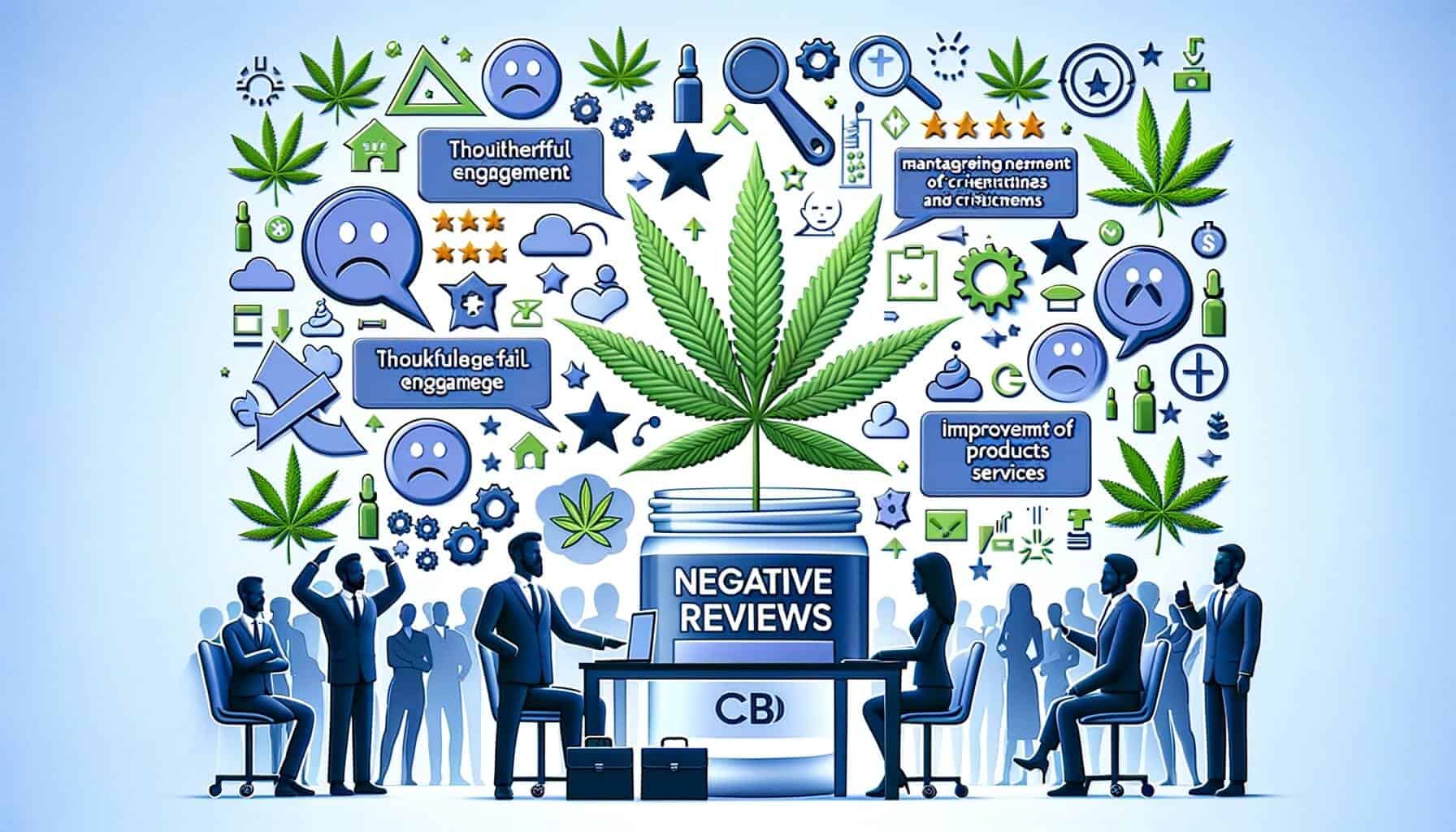
By admin December 28, 2024
In recent years, the CBD industry has experienced exponential growth, with consumers seeking natural alternatives for various health and wellness concerns. However, as with any booming industry, negative reviews are bound to arise. Negative reviews can have a significant impact on a CBD company’s reputation and success.
In this article, we will explore the importance of handling negative reviews in the CBD industry and provide a comprehensive guide on how to effectively manage them.
The Importance of Responding to Negative Reviews: Building Trust and Reputation

Negative reviews can be detrimental to a CBD company’s reputation if left unaddressed. Ignoring negative feedback can lead to a loss of trust among existing and potential customers. On the other hand, responding to negative reviews in a timely and professional manner can help build trust and demonstrate a commitment to customer satisfaction.
1. Acknowledge the Review: When responding to negative reviews, it is crucial to acknowledge the customer’s concerns. Begin by thanking them for their feedback and expressing your commitment to resolving the issue.
2. Stay Professional and Empathetic: It is essential to maintain a professional tone and show empathy towards the customer’s experience. Avoid becoming defensive or dismissive, as this can further escalate the situation.
3. Offer a Solution: After acknowledging the customer’s concerns, provide a solution or offer to rectify the issue. This could include a refund, replacement product, or personalized assistance to address their specific needs.
4. Take the Conversation Offline: To maintain privacy and resolve the issue more effectively, encourage the customer to continue the conversation offline. Provide contact information or direct them to a customer service representative who can assist them further.
5. Follow Up: After resolving the issue, follow up with the customer to ensure their satisfaction. This demonstrates a commitment to customer care and can help rebuild trust.
Analyzing Negative Reviews: Identifying Valid Concerns and Constructive Feedback

Negative reviews can provide valuable insights into a CBD company’s products, services, and overall customer experience. Analyzing these reviews can help identify valid concerns and constructive feedback, allowing companies to make necessary improvements.
1. Look for Patterns: Analyze negative reviews to identify recurring themes or patterns. This could indicate common issues that need to be addressed, such as product quality, shipping delays, or customer service shortcomings.
2. Separate Valid Concerns from Unreasonable Complaints: While some negative reviews may be valid and require attention, others may be unreasonable or unfounded. It is essential to differentiate between the two and prioritize addressing valid concerns.
3. Consider the Source: Take into account the credibility and expertise of the reviewer. Some negative reviews may come from industry professionals or experienced CBD users, providing valuable insights that can help improve products or services.
4. Seek Feedback from Employees: Engage with employees who interact directly with customers, such as customer service representatives or sales staff. They may have valuable insights into common customer complaints or suggestions for improvement.
5. Utilize Customer Surveys: Implementing customer surveys can help gather feedback and identify areas for improvement. This proactive approach allows companies to address concerns before they escalate into negative reviews.
Addressing Customer Complaints: Effective Strategies for Resolving Issues

Addressing customer complaints promptly and effectively is crucial for maintaining customer satisfaction and loyalty. Here are some strategies for resolving issues raised in negative reviews:
1. Prompt Response: Respond to negative reviews as soon as possible to show customers that their concerns are being taken seriously. Delayed responses can further frustrate customers and damage the company’s reputation.
2. Investigate the Issue: Thoroughly investigate the customer’s complaint to understand the root cause of the problem. This may involve reviewing order details, product specifications, or communication records.
3. Offer a Solution: Once the issue has been identified, provide a suitable solution to the customer. This could include a refund, replacement product, or additional support to address their concerns.
4. Communicate Transparently: Keep the customer informed throughout the resolution process. Provide regular updates on the progress of their complaint and any actions being taken to rectify the issue.
5. Learn from Mistakes: Use customer complaints as an opportunity to learn and improve. Analyze the underlying causes of the complaint and implement measures to prevent similar issues from occurring in the future.
Leveraging Negative Reviews for Improvement: Using Feedback to Enhance Product Quality

Negative reviews can serve as a valuable source of feedback for CBD companies, enabling them to enhance product quality and customer satisfaction. Here are some ways to leverage negative reviews for improvement:
1. Identify Product Deficiencies: Negative reviews often highlight specific product deficiencies or areas for improvement. Analyze these reviews to identify recurring issues and prioritize addressing them.
2. Conduct Product Testing: Use negative reviews as a basis for conducting product testing and quality control. This can help identify any potential issues before they reach customers and improve overall product quality.
3. Engage with Product Development Teams: Share negative reviews with product development teams to gather insights and suggestions for improvement. This collaboration can lead to product enhancements and innovations.
4. Seek External Expertise: Consider seeking external expertise, such as third-party testing or consulting services, to evaluate product quality and identify areas for improvement. This objective perspective can provide valuable insights.
5. Communicate Product Updates: Once improvements have been made based on negative reviews, communicate these updates to customers. This demonstrates a commitment to continuous improvement and can help rebuild trust.
Managing Online Reputation: Proactive Steps to Minimize Negative Reviews
Managing online reputation is crucial for CBD companies to minimize the impact of negative reviews and maintain a positive brand image. Here are some proactive steps to consider:
1. Monitor Online Platforms: Regularly monitor online platforms, including review websites, social media channels, and forums, to stay informed about customer feedback and address any negative reviews promptly.
2. Encourage Positive Reviews: Actively encourage satisfied customers to leave positive reviews. This can help counterbalance negative reviews and improve the overall perception of the company.
3. Respond to Positive Reviews: Just as it is important to respond to negative reviews, it is equally important to acknowledge and respond to positive reviews. This shows appreciation for customer support and encourages further engagement.
4. Implement Review Management Tools: Utilize review management tools that can help streamline the process of monitoring and responding to reviews. These tools can provide notifications, analytics, and other features to effectively manage online reputation.
5. Engage with Influencers: Collaborate with influencers or industry experts to promote positive reviews and testimonials. Their endorsement can help build credibility and trust among potential customers.
Communicating with Unhappy Customers: Tips for Effective Customer Service
Effective communication with unhappy customers is essential for resolving issues and maintaining customer satisfaction. Here are some tips for providing excellent customer service:
1. Active Listening: Practice active listening when engaging with unhappy customers. Allow them to express their concerns fully and demonstrate empathy by acknowledging their emotions.
2. Stay Calm and Professional: Maintain a calm and professional demeanor when communicating with unhappy customers, even if they become confrontational. Responding with patience and understanding can help de-escalate the situation.
3. Provide Timely Responses: Respond to customer complaints promptly to show that their concerns are being taken seriously. Delayed responses can further frustrate customers and damage the company’s reputation.
4. Personalize the Response: Tailor responses to address the specific concerns raised by the customer. Avoid generic or automated responses, as they can come across as insincere.
5. Offer Compensation or Incentives: In some cases, offering compensation or incentives can help appease unhappy customers. This could include discounts, free products, or personalized assistance to address their specific needs.
Turning Negative Reviews into Positive Experiences: Transforming Dissatisfied Customers into Brand Advocates
While negative reviews can initially harm a company’s reputation, they also present an opportunity to turn dissatisfied customers into brand advocates. By effectively addressing their concerns and providing exceptional customer service, CBD companies can transform negative experiences into positive ones.
1. Resolve the Issue: Address the customer’s concerns promptly and effectively. By resolving the issue to their satisfaction, you can turn their negative experience into a positive one.
2. Go Above and Beyond: Exceed customer expectations by going above and beyond to rectify the issue. This could include offering additional support, personalized assistance, or compensatory measures.
3. Follow Up: After resolving the issue, follow up with the customer to ensure their satisfaction. This demonstrates a commitment to customer care and can help rebuild trust.
4. Request a Revised Review: If the customer’s concerns have been successfully addressed, kindly request that they update or revise their negative review to reflect their positive experience. This can help counterbalance the initial negative feedback.
5. Offer Incentives for Advocacy: Consider offering incentives, such as discounts or referral programs, to customers who have had their negative experiences successfully resolved. This can encourage them to become brand advocates and share their positive experiences with others.
Legal Considerations: Navigating Regulatory Challenges in the CBD Industry
In the CBD industry, companies must navigate various legal considerations when responding to negative reviews. It is essential to understand and comply with relevant regulations to avoid legal repercussions. Here are some key legal considerations:
1. Truthful and Substantiated Claims: Ensure that any statements made in response to negative reviews are truthful and supported by evidence. Avoid making false or misleading claims about products or services.
2. Privacy and Data Protection: Protect customer privacy and comply with data protection regulations when communicating with customers about their negative reviews. Avoid sharing personal information without consent.
3. Intellectual Property Rights: Respect intellectual property rights when responding to negative reviews. Avoid using copyrighted material or trademarks without proper authorization.
4. Compliance with Advertising Regulations: Be mindful of advertising regulations when addressing negative reviews. Avoid making unsubstantiated claims or promoting products in a way that violates advertising guidelines.
5. Consult Legal Professionals: When in doubt, consult legal professionals who specialize in the CBD industry to ensure compliance with relevant regulations. They can provide guidance on navigating legal challenges associated with negative reviews.
FAQs
Q1. How should CBD companies respond to negative reviews?
CBD companies should respond promptly and professionally to negative reviews, addressing customer concerns and offering solutions. This demonstrates a commitment to customer satisfaction and can help build trust and loyalty.
Q2. Can negative reviews be beneficial for CBD brands?
Yes, negative reviews can provide valuable feedback for CBD brands, helping them identify areas for improvement and enhance their products or services.
Q3. How can CBD companies leverage negative reviews for improvement?
CBD companies can leverage negative reviews by analyzing feedback, identifying common issues, and making informed decisions to enhance product quality, formulation, or customer service.
Q4. What are some proactive steps CBD companies can take to manage their online reputation?
CBD companies can manage their online reputation by monitoring online platforms, engaging with customers, encouraging positive reviews, and promptly addressing any negative feedback.
Conclusion
Negative reviews are an inevitable part of the CBD industry, but they should not be feared. Instead, CBD companies should embrace negative reviews as opportunities for growth and success.
By understanding the impact of negative reviews, responding effectively, analyzing feedback, addressing customer complaints, leveraging feedback for improvement, managing online reputation, communicating with unhappy customers, turning negative experiences into positive ones, considering legal considerations, and embracing negative reviews as opportunities for growth, CBD companies can build trust, enhance their reputation, and ultimately thrive in the industry.
Remember, it is not the presence of negative reviews that defines a company, but rather how they are handled and used to drive positive change.
